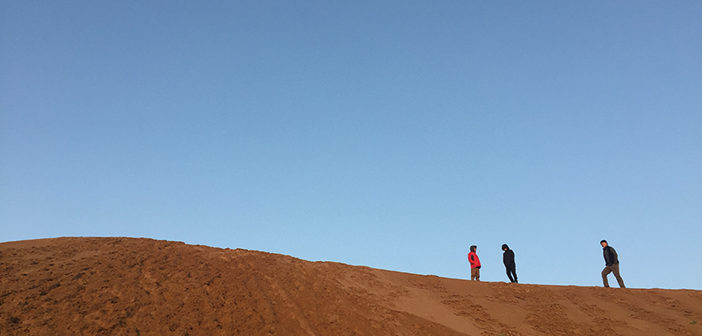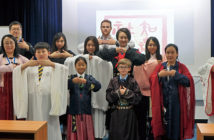There’s a defining scene from the 1989 film Dead Poets Society where Robin Williams’ character orders his students to rip up their textbooks. Once they get past the initial shock, they venture outdoors where they begin to relate to each other, discover their true selves, and seize the day together.
Nothing quite as radical is happening at Beijing’s international schools. However, there exists a similar hunger and spirit for getting outside the classroom and embarking on an educational component that is often overlooked yet proving indispensable: experiential learning. This philosophy of learning emphasizes the value of immersion outdoors and among peers, active participation versus passive learning, and an overall experience that informs teamwork and individualism. While the program is still finding its way into the curriculums at many schools globally, the concept of experiential learning has existed for thousands of years.
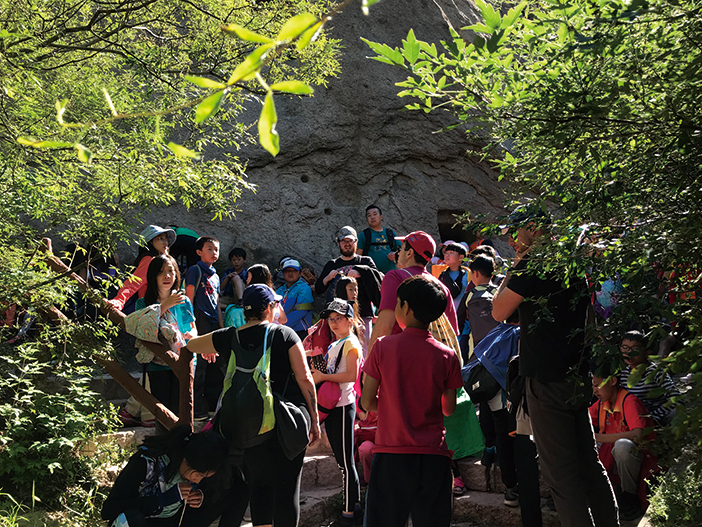
Outdoor learning is still centered around the traditional subjects: math, languages, science, humanities, and so on. However, these lessons take on a more engaging role and demand more from students than the memorization of equations. Once outdoors, math takes on new life, whether it’s taught in the form of managing money for a camping menu or building a whitewater raft as a team. The only difference? The surroundings.
More of Beijing’s international schools are embracing and developing this method of teaching, which exposes students of all ages to an idea simply defined and, more often than not, joyfully executed: learning by doing.
“Experiential learning in the outdoors covers pretty much all aspects of the curriculum,” says Chris Cartwright, coordinator of experiential education at Keystone Academy. “It’s very difficult to define it. What I think is important is that schools make their own definition, which is linked to their core values and educational philosophy.”
One way to define “learning by doing” boils down to acquiring the essential life skills that will serve students later in life, specifically right after graduation as they embark into the unknown and away from the comforts of home. These skills include self-awareness, engagement, resilience, and empathy. Such traits are not innate; they emerge only through real, rigorous experience, and they add up to an “emotional intelligence,” as one international teacher puts it, that helps shape students into individuals. Throughout their time embedded in the program, the students are expected to evolve into leaders ready to take on the world.
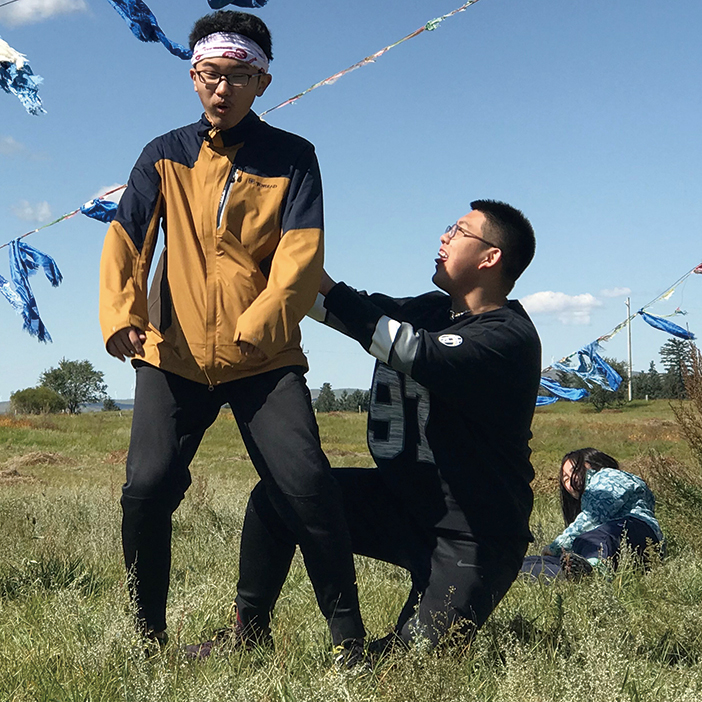
Experience outside of the classroom is a significant factor in acquiring and developing the knowledge needed to excel at more than academics alone. Every student at Keystone Academy is exposed to experiential learning, and the school builds its programs on the shared values: Bilingual immersion in Chinese and English; building character and community throughout their residential setting; promoting Chinese culture and identity in a world context. Experiential learning is so valued here, so ingrained in Keystone’s fabric, that the school assesses the strength of every student’s character before they are given the go-ahead to graduate.
“It’s amazing what opportunities we can give our students right from foundation level through graduation for experiential learning purposes,” says Cartwright, who arrived in Beijing eight months ago after 30 years in the field, most recently in Mongolia. There he developed the Mongolia Institute of Outdoor Learning, which helped create opportunities for students to develop as teams and become leaders ahead of their career pursuits.
Indeed, a significant component of experiential learning is outdoor education. In this context, field trips are not for sightseeing. Each expedition is treated as project-based, community-service adventure bursting with lessons seldom found in a textbook. Earlier this school year, Keystone’s youngest students camped along the Baihe River and at Yudu Mountain, while some of the older ones visited Western Academy of Beijing’s Miao Liang Environmental Education Center, in the Mi Yun Mountains. The oldest students got to spend six days exploring areas of Inner Mongolia and discovering ways to improve both themselves and the environment around them. These trips might include hiking, skiing, canoeing, and camping, among other new challenges.
Qualified instructors accompany the students throughout these treks, where groups learn to cook for themselves and to look out for each other. If not for outdoor education, few students would ever get the chance to rappel down a rock face and experience the emotions and instincts that accompany that first step over the ledge and down the cliffside.
“We put the students on the edge of their comfort zone,” Cartwright says. “We want the students to experience apparent risk, but not real danger. That way they learn greater confidence, greater self-esteem, and greater accomplishment.”

Keystone Academy students exploring the culture of Inner Mongolia
Over at Beijing International Bilingual Academy (BIBA), instructors break down the outdoor-education curriculum into a system they call the Four Rs: Relationships, Respect, Rigor, and Responsibility. Each “R” corresponds to a specific grade level. For those transitioning into high school, that first outdoor trip away from home emphasizes Relationships, and how to build and maintain them; the students a year ahead learn the importance of Respect for other cultures, and for each other.
For the Year 8 students, the theme of Rigor involves a trip through the Gobi Desert for three days of hiking, planting trees to confront erosion, and camping in tents in unknown conditions. One night earlier this year, the students encountered the unexpected when a sandstorm blasted their tents. Such sudden, drastic conditions might have shaken the students. But as a team, they took cover and remained calm, applying the values they’d been learning, and packed it all up the next morning and moved on together.
“The majority of people are a lot happier when they’re experiencing new challenging environments outdoors,” says James Kelly, coordinator of outdoor education at BIBA. “There’s a huge pressure on these kids to be the best academically. But emotional and social learning are also required to get them into top universities. Kids need the ability to talk to people and to look after themselves, and to be able to communicate within a team.”
Because students are under such heat to succeed academically, the traditional accountability of tests and textbooks often overshadows the skills and objectives best acquired outside. Understandably, many parents initially resisted the experiential-learning discipline; after all, it cannot be measured by a tangible score or metric. As many parents have asked, what is the value of learning without the computers, without the tests? Why shouldn’t they just stay indoors? While there is a lot to be said for traditional classroom instruction, teachers say a book cannot quite capture the value of finding one’s way independently on an overnight hike, for example.
“We are tasked with enhancing a child’s natural curiosity and ability to learn by giving them structured, progressive, and developmental programs throughout their school life,” Cartwright says. “And this is something that now seems to be more and more valued by our Chinese parents.”
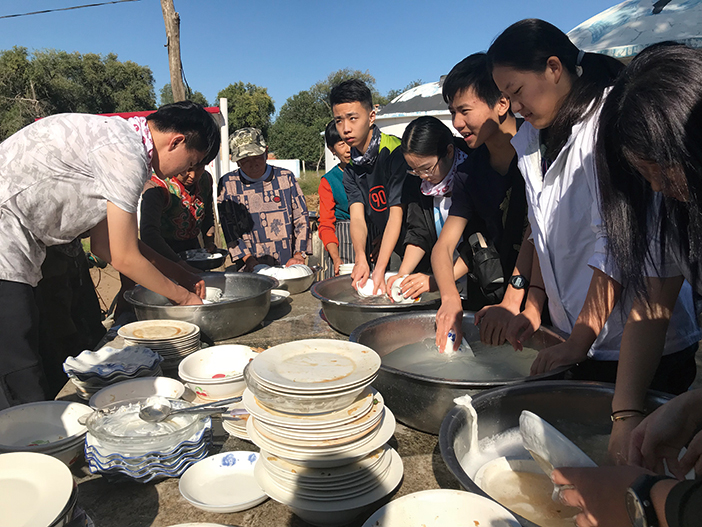
Many intrigued parents have come around on outdoor education’s role within the greater program of experiential learning. And, as BIBA’s James Kelly notes, this encouragement has been helped along by the school’s adoption of the world’s leading youth achievement award, known as the Duke of Edinburgh’s International Award program. Set to launch at BIBA next year, the 60-year-old award recognizes community and personal development and improvement in students all over the world, with 6,000 of them participating in China.
Kelly studied at La Trobe, Australia’s leading outdoor education university, in Melbourne. He later taught for five years at the Scots College, a Sydney-based boarding school for boys. There, he took a group along to live with him in Kangaroo Valley – for six months. That long term journey taught independence, the importance of studying local species and biodiversity, and the strategies necessary to save animals and plants encountered along the way. “These moments become reference points for life,” Kelly says. “They become experiences that people are always able to look back on and learn from.”
Rather than take a written test to reflect their understanding and overall impression of an outdoor experience, the students debrief together with the teachers: What did you learn? What have you drawn from this experience? What are you finding out about your own limits, and how to push past them?
Back in the West, specifically the US, most outdoor education is limited to weekend campouts with the Boy Scouts and Girl Scouts of America. Achievement is based on merit badges in the areas of wilderness survival, family life, and local citizenship among many others. With the level of experiential education offered at Beijing international schools like BIBA and Keystone, students are exposed to a more consistent education outdoors – and within themselves.
To begin with, students learn to listen. They learn to talk to each other, support one another, and tackle new challenges as a team in order to help strengthen a community together. Skills picked up and honed from an immersive experience within a safe, controlled environment push students to their best selves. And, along the way, they learn courage and tenacity, they begin to appreciate compassion and diversity. “These are the people that the universities are interested in,” Cartwright says, “the ones who have got good grades and character that makes them stand out.”
It’s no secret that college admissions offices – and, later, CEOs – receive countless applications and resumes for a very limited number of spots. When these students begin their college search, they will be served by the emotional intelligence they nurtured within these experiential learning programs.
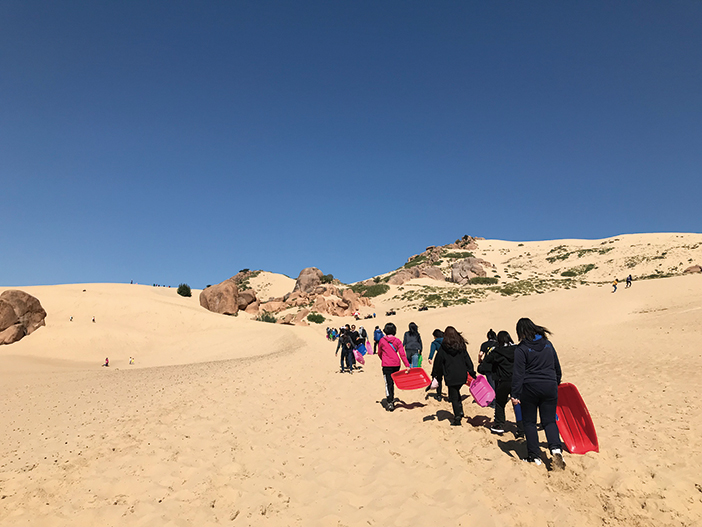
“Experiential learning has made me understand the importance of practical exploration and empathy,” says Keystone Academy Grade 11 student Zongqi Yu. “I have gained firsthand experience of local and global issues. Climate change and cultural preservation urge me to think about how I can solve these issues and how I can contribute.”
The value of good grades should not be dismissed. But many teachers agree that it is only one element of learning, and rarely are straight A’s considered the most important aspect of a person’s character.
Outdoor education offers students the chance to step outside of the classroom, and outside of themselves. And within the broad framework of experiential learning, those students’ minds take a much more active path. Things begin to stick in ways that learning by repetition or memorization can’t. Sitting in class provides a necessary structure. But only outside does a student gain a visceral experience by encountering conflict, interacting appropriately with others, or executing a challenging task by taking a risk.
It all helps define the relationships between humanity and the environment, between experience and emotion. And it steers young students toward a path of growth into an individual with a depth of character.
Or, as student Zongqi Yu puts it, “a global citizen with wisdom and compassion.”
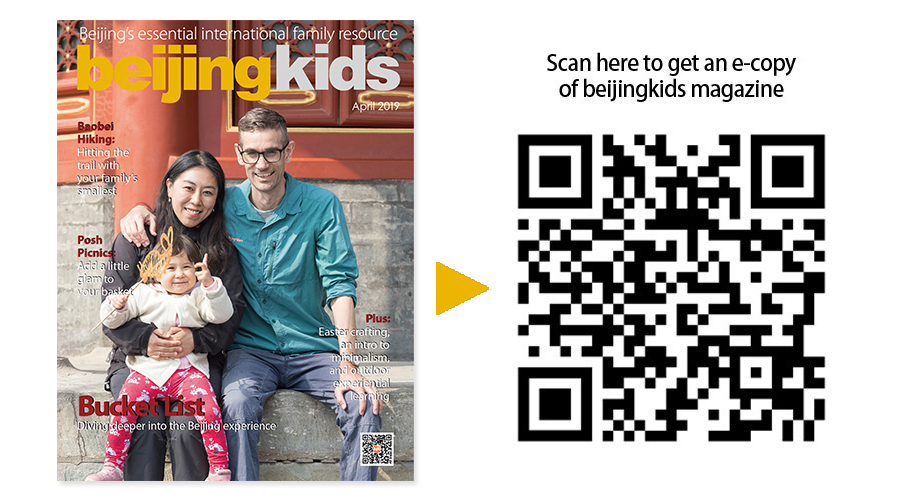
This article first appeared in the beijingkids April 2019 Exploring Beijing issue.
Photos: Uni You

